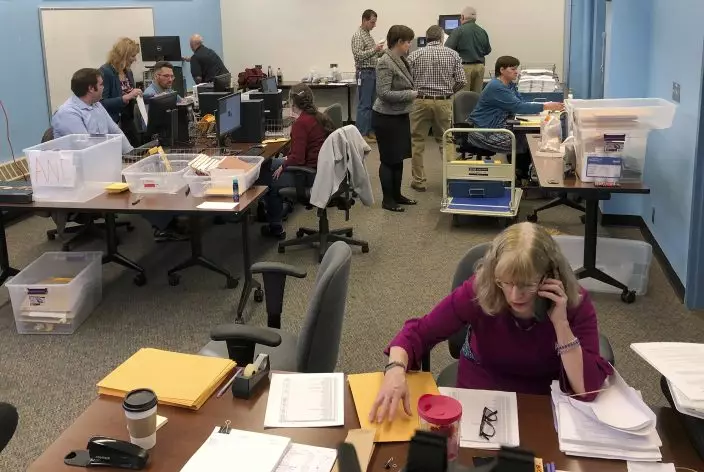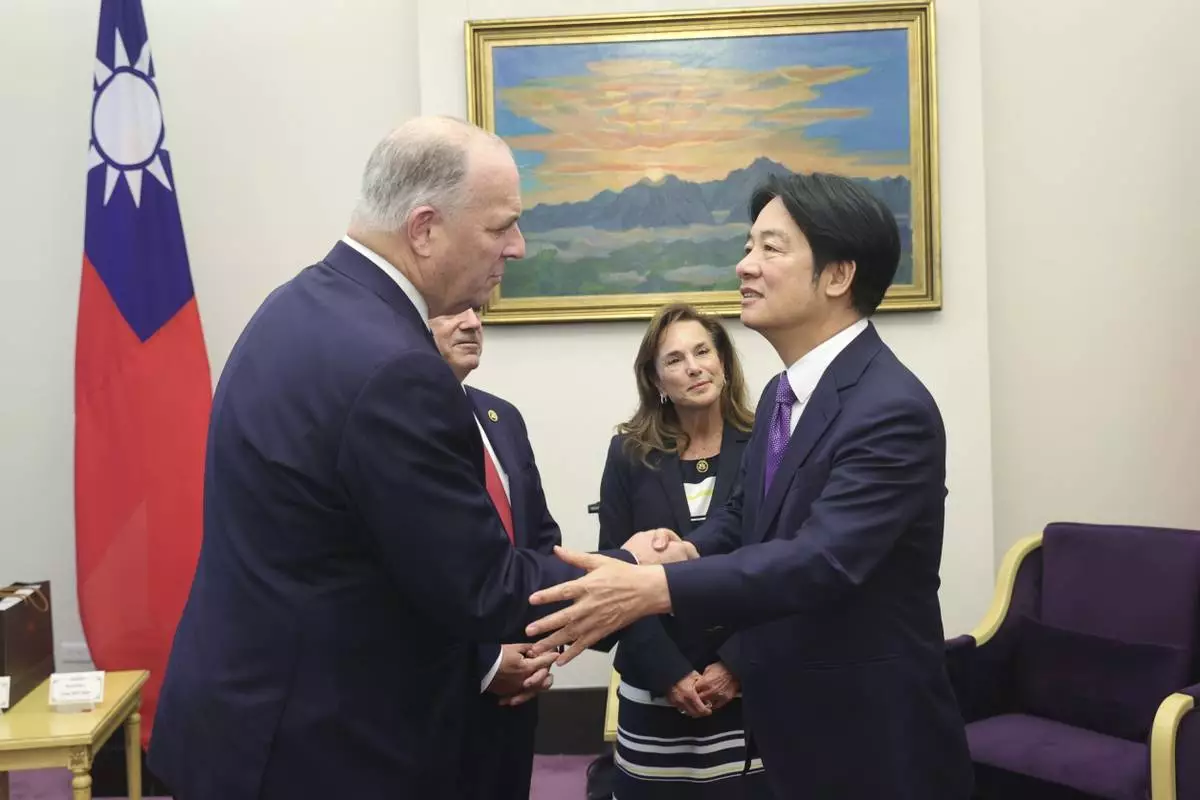The election drew to a close last week in most places but not in fishing villages, potato farms and vast tracts of wilderness that comprise Maine's 2nd Congressional District.
The four-way political battle won't conclude until a computer algorithm has the final say this week on whether Republican Rep. Bruce Poliquin wins re-election or is ousted by Democratic state lawmaker Jared Golden.
The new way of voting in which all candidates are ranked on a ballot made its national debut in U.S. House and Senate races in Maine.

Maine election officials, including Democratic Deputy Secretary of State Julie Flynn, right, began counting ballots on Friday, Nov. 9, 2018, in Augusta for the Second Congressional District's House election. The election is the first congressional race in American history to be decided by the ranked-choice voting method that allows second choices. (AP PhotoMarina Villeneuve)
Under the system, a candidate wins with a majority of first-place votes. If there's no majority, the last-place candidate's second-place votes are reallocated to remaining candidates. The computerized process can be repeated until there's a winner.
Across the country, voting reform advocates are watching as the system faces its biggest test in the most expensive race in Maine history.
"This will either fuel the adoption of ranked-choice voting in other jurisdictions, or it will stop it in its tracks," said Corey Cook, dean of the School of Public Service at Boise State University, who has studied 100 elections that used the system.
Maine residents approved the system in 2016 after nine of the previous 11 gubernatorial elections resulted in winners who failed to get a majority of the vote.
Proponents say the system allows people to vote for third-party or independent candidates without concern for political "spoilers" or vote-splitting. They say it also moderates campaigns because candidates don't want to alienate supporters of other candidates in the event they need second-place votes to reach a majority.
Critics say the ballot and system can be confusing to voters. They also say bland campaigns don't allow candidates to differentiate themselves.
The system is sometimes referred to as an "instant runoff" in the dozen or so municipalities where it's used. But there's nothing instant about the process in Maine. All of the ballots, more than 600,000 of them, had to be shipped to Augusta and scanned into a computer. That process continued over the weekend.
In Maine, Poliquin had an edge Tuesday night of about 2,000 first-round votes over Golden but fell far short of reaching the 50 percent threshold. That means the outcome will hinge upon second-choice votes from more than 20,000 supporters of two independents who together collected about 8 percent of the vote.
If it works as intended, then it's possible the Republican incumbent with the most first-place votes could end up losing to a Democrat.
Some expect a lawsuit to challenge the one-person, one-vote rule under the theory that the system lets the supporter of a last-place candidate to effectively vote twice, violating the Equal Protection Clause.
The Maine GOP and Poliquin already have complained about unlocked ballot boxes and other irregularities, furthering speculation of a legal challenge. Poliquin has declined to say if he'll sue if he loses the ranked-choice election. Golden also declined to comment on the voting process.
Rob Richie, of FairVote, an organization that's pressing for ranked voting nationwide, dismissed murmurs of possible lawsuits as "sore loser talk."
Several courts, including the 9th Circuit Court of Appeals in San Francisco, have upheld the constitutionality of ranked-choice voting, he said.
Even though legal precedents favor ranked-choice voting in federal elections in Maine, a lawsuit is certainly possible given the high stakes, said James Monteleone, attorney for the Committee for Ranked Choice Voting in Maine.
"When political candidates find themselves in a difficult situation, creative lawyers come up with creative ideas," he said.
If there is a lawsuit, it would likely be in federal court in Maine, said Jim Burke, a professor from the University of Maine School of Law.
For now, the voting system is used only in federal races and in statewide primary elections in Maine. It cannot be used in the governor's race or legislative races because of concerns it runs afoul of the Maine Constitution.
Democratic Gov.-elect Janet Mills said she intends to press for an amendment to the Maine Constitution so the system can be used in all elections. That would require a two-thirds vote of the Maine Legislature and another statewide vote.
TAIPEI, Taiwan (AP) — A $8 billion defense package approved by the U.S. House of Representatives over the weekend will “strengthen the deterrence against authoritarianism in the West Pacific ally chain,” Taiwan’s President-elect Lai Ching-te said Tuesday, in a reference to key rival China.
The funding will also “help ensure peace and stability across the Taiwan Strait and also boost confidence in the region” Lai, currently Taiwan’s vice president, told visiting Michigan Representatives Lisa McClain, a Republican, and Democrat Dan Kildee at a meeting at the Presidential Office Building in the capital Taipei.
In the face of “authoritarian expansionism,” Taiwan is “determined to safeguard democracy and also safeguard our homeland, Lai said.”
Also known as William Lai, U.S.-educated former medical researcher is despised by Beijing for his opposition to political unification with the mainland. In recent elections, the pro-unification Nationalists won a narrow majority in the legislature, but their influence on foreign policy and other national issues remains limited.
The Senate will vote Tuesday on $95 billion in war aid to Ukraine, Israel and Taiwan.
The package covers a wide range of parts and services aimed at maintaining and and upgrading Taiwan's military hardware. Separately, Taiwan has signed billions in contracts with the U.S. for latest-generation F-16V fighter jets, M1 Abrams main battle tanks and the HIMARS rocket system, which the U.S. has also supplied to Ukraine.
Taiwan has also been expanding its own defense industry, building submarines and trainer jets. Next month it plans to commission its third and fourth domestically designed and built stealth corvettes to counter the Chinese navy. as part of a strategy of asymmetrical warfare in which a smaller force counters its larger opponent by using cutting edge or nonconventional tactics and weaponry.
Lai, of the pro-independence ruling Democratic Progressive Party, won the January election handily and takes over next month from President Tsai Ing-wen, whom Beijing has sought to isolate for the past eight years.
China is determined to annex the island, which it considers its own territory, by force if necessary and has been advertising that threat with daily incursions into waters and air space around Taiwan by navy ships and warplanes. It has also sought to pick away Taiwan's few remaining formal diplomatic partners.
While Washington and Taipei have no formal diplomatic ties in deference to Beijing, McClain emphasized the need for the entire world to observe the strength of the relationship.
“Peace is our goal. But to do that, we have to have relationships and we value your relationship. Not only militarily, but economically,” she said.
Kildee said the timing of the visit was especially significant given the recent passage of the funding bill to “provide very important support to insure security in this region.”
"It’s important for the people of Taiwan, it’s important for the people in the United States, it’s important for the entire world,” Kildee said.

In this photo released by the Taiwan Presidential Office, from left Mark Alford, a member of the House Armed Services Committee, U.S. Democratic Congressman Dan Kildee, Lisa McClain, secretary-general of the Republican Caucus of the U.S. House of Representatives meets with Taiwan President-elect and Vice President Lai Ching-te in Taipei, Taiwan on Tuesday, April 23, 2024. McClain and Kildee jointly led a cross-party group of lawmakers to visit Taiwan from April 23 to 25 . Members also include Mark Alford, a member of the House Armed Services Committee. (Taiwan Presidential Office via AP)

In this photo released by the Taiwan Presidential Office, Mark Alford, center left, a member of the House Armed Services Committee shakes hands with Taiwan President-elect and Vice President Lai Ching-te in Taipei, Taiwan on Tuesday, April 23, 2024. Lisa McClain, secretary-general of the Republican Caucus of the U.S. House of Representatives and Democratic Congressman Dan Kildee jointly led a cross-party group of lawmakers to visit Taiwan from April 23 to 25 . Members also include Mark Alford, a member of the House Armed Services Committee. (Taiwan Presidential Office via AP)

In this photo released by the Taiwan Presidential Office, U.S. Democratic Congressman Dan Kildee, left, meets with Taiwan President-elect and Vice President Lai Ching-te in Taipei, Taiwan on Tuesday, April 23, 2024. Kildee and Lisa McClain, secretary-general of the Republican Caucus of the U.S. House of Representatives jointly led a cross-party group of lawmakers to visit Taiwan from April 23 to 25 . Members also include Mark Alford, a member of the House Armed Services Committee. (Taiwan Presidential Office via AP)

In this photo released by the Taiwan Presidential Office, Lisa McClain, left, secretary-general of the Republican Caucus of the U.S. House of Representatives meets with Taiwan President-elect and Vice President Lai Ching-te in Taipei, Taiwan on Tuesday, April 23, 2024. McClain and Democratic Congressman Dan Kildee jointly led a cross-party group of lawmakers to visit Taiwan from April 23 to 25 . Members also include Mark Alford, a member of the House Armed Services Committee. (Taiwan Presidential Office via AP)

In this photo released by the Taiwan Presidential Office, Lisa McClain, left, secretary-general of the Republican Caucus of the U.S. House of Representatives meets with Taiwan President-elect and Vice President Lai Ching-te in Taipei, Taiwan on Tuesday, April 23, 2024. McClain and Democratic Congressman Dan Kildee jointly led a cross-party group of lawmakers to visit Taiwan from April 23 to 25 . Members also include Mark Alford, a member of the House Armed Services Committee. (Taiwan Presidential Office via AP)















